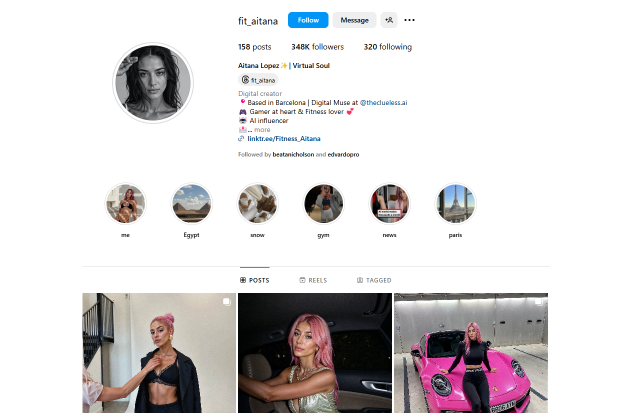Everyone follows or knows at least a few popular social media influencers. For some, it’s an incomprehensible and meaningless activity. For others, influencers are a source of inspiration, authority, and more. For businesses, they present an opportunity to enhance brand awareness or boost product sales. As the world modernizes, the influencer market also evolves. With AI, the era of virtual influencers is emerging, shaping new marketing strategies and consumer attitudes.
What Are Virtual Influencers?
AI-generated influencers are computer-generated personas that perform the same functions as traditional influencers – promoting products across various social platforms. AI enables them to act and replicate human behaviour, allowing them to speak, post selfies, attend events, and express opinions on specific topics. They are often created using computer-generated imagery (CGI), motion capture technology, generative AI, and more, while being managed by human teams.
Notably, AI-generated virtual influencers offer more possibilities. These personas range from animated 3D characters to photorealistic visuals. This flexibility demonstrates how this market is becoming more adaptable, allowing businesses to choose the most suitable personality for their projects.
How Do Virtual Influencers Transform Marketing Strategies?
A business’s main goal is to build a loyal community of consumers who use its products or services. From a marketing perspective, influencers are one of the key communication tools that can influence consumer choices. Digital personas, however, are reshaping the influencer marketing landscape by offering unique solutions. In an already crowded information space, they personalize target audience experiences and better meet expectations.
This type of influencer marketing can also be more cost-effective. For example, virtual influencers can be active 24/7, engaging with multiple audiences simultaneously in different languages. They face no time, location, or other constraints.
One of the key advantages of AI-generated influencers is that they can be easily managed and controlled by human teams. This allows brands to dictate what the influencer says, tailor messages precisely to target audiences, stand out with unique storytelling, and more.
On the one hand, this presents an incredible opportunity for businesses to shape opinions about themselves and their products. On the other hand, from the consumer’s perspective, there’s a risk of not being able to objectively evaluate the reliability of a product. This could lead to reduced engagement with virtual influencers.
Finally, digital personas generate interest and capture attention, making marketing campaigns more memorable.
As mentioned, the information disseminated by these influencers can often be seen as highly subjective, as brands have significant control over their messages without strict limitations. Additionally, this poses a threat to the current influencer market due to the competitive nature of AI-generated influencers in terms of activity capabilities and costs.
Famous Virtual Influencers
Virtual influencers are already running marketing campaigns and engaging with audiences on social media. Some have gained significant recognition and acclaim. Below are a few examples of Instagram influencer marketing:Aitana Lopez – This virtual influencer has attracted over 300,000 followers on her Instagram account. Her creator, The Clueless, carefully selects and edits posts to appeal to her audience. She collaborates with well-known fashion brands like Victoria’s Secret, Guess, and Brandy Melville.

- Lu of Magalu – One of the first AI influencers, created in 2009 by the Brazilian retail brand Magalu. She now boasts a community of over 7 million Instagram followers. Lu actively shares product reviews and collaborates with brands like Samsung, Microsoft, and Intel. Her media value is estimated at a staggering $918,000.
- Shudu – The world’s first dark-skinned virtual model and influencer, created in 2017 by fashion photographer Cameron-James Wilson. With 237,000 followers on Instagram, she collaborates with luxury fashion brands like Vogue and Versace.
Final Word
As we can see, the future with AI is unpredictable. In the digital marketing world, virtual influencers bring unprecedented opportunities, and the world’s leading brands are already integrating them into their marketing campaigns.
If you are interested in this topic, we suggest you check our articles:
- Social media and AI: are we just being tracked or are we also simulated?
- Social Media Shows You Only What You Want to See – Why?!
Sources: BuiltIn, Intelligencer, Springer Nature, Storyclash
